#Sam also frequently says he loves Frodo in the books so come on just live a little
Note
You can ship Frodo and Sam all you want, but saying that the reason why Frodo let Sam and Rosie live with him because he was in love with him simply isn't true. Arwen gave her place on the ships to Valinor to Frodo, confirming that he would not live out his days in Middle-earth. When Gaffer Gamgee died, Sam did not inherit the family home because he had an older brother. He also did not inherit Rosie's family home through marriage because she had an older brother, as well. Merry was an only child, and Pippin had 3 sisters, so they both would inherit their family homes when their fathers died. Out of the 4 hobbits, Sam was the only one who was from a working-class background, so he would not be able to buy a home for himself (or pay to have one built). Frodo knew he would soon leave the Shire for good, but he wasn't going to give everything to any hobbits who might have been his friends but weren't even relevant enough to appear in the films. The only person he could leave Bag End to was Sam, because not only was he Frodo's only friend who had no home to call his own but also because Sam had tended to the gardens for years and Frodo knew that Sam would take good care of it. Not out of gay love.
That’s a nice theory! But also if you look at the family tree in the appendices, Sam’s brothers had left the Hobbiton area, one to become a roper and another “removed to North-farthing”, so in theory the son who had followed in his father’s footsteps would have been the most likely to inherit the house, if we’re following your line of argument.
but also, on page 1001 (Book 6, Chapter 9), Frodo does ask, “‘When are you going to move in and join me, Sam?’” Note that the previous gardener, Sam’s father, did not live in Bag End with Bilbo, and Sam needn’t have moved out of the Gaffer’s house, as generational homes were more common (see the Great Smials). Frodo asks this before knowing Sam wanted to marry Rosie. Also, in the books Frodo did sell Bag End to the Sackville-Bagginses, and post-Scouring of the Shire and all that, could have likely left the place to his other friend who did not go with him on the whole journey, Fredegar Bolger, who we know less about but is mentioned as being one of Frodo’s closest friends in the beginning of the story. So I’ll leave that for you to ponder.
and besides, when did something being not true in a fictional world here on tumblr.com matter? Why not make it gay?
#lotr#anon ask#seriously the first ask I have gotten since 2016 and you come into /my home/#but also like have a little whimsy in your life my dude#Sam also frequently says he loves Frodo in the books so come on just live a little
0 notes
Text
Fellowship of the Ring rewatch thoughts from one of those intense lotr nerds!
- One thing that strikes me after so long - I think the last time I saw it was about 3 years ago - is not just the music but the sound...the sound effects for the heaviness of the Ring, the way spells echo and amplify when Gandalf or Arwen speak them, the sound effects for bowstrings, the screams of the Nazgul being so inhuman, the drums in the deep of Moria, the scrape of stone on stone for the Balrog...if the sound hadn’t bee so good the movies honestly wouldn’t have worked this well. God the soundtrack.
- I will always have little quibbles about stuff -- the Ring moving onto Frodo’s finger in Bree with CGI, Galadriel’s over the top green CGI moment, the fact that we see too much of the Watcher in the Water -- but in general, like in GENERAL, the fact that these movies are so beautiful and well made....we didn’t just dodge a bullet we dodged a nuclear weapon LOL....we really did. These could have been so atrociously bad, but instead they are beautiful.
- no one should be reading LOTR as an allegory anyway, but the Ring is often read as an allegory for addiction or a nuclear weapon and somehow not as frequently likened to carrying trauma. Which is absolutely wild to me. The concept of carrying something that poisons and hurts you but that you can’t put down....it seems much more similar to trauma than many of the things I see it compared too
- I love moral complexity, greyness, etc, but I find the idea that the Ring is just utterly and completely evil very refreshing. That there are things that you cannot compromise on, that are indisputably evil.
- One thing i love about LOTR is the fact that it is not what people think of as “high fantasy” - it doesn’t take place in a shiny, perfect world, it takes place in a decayed, faded, eroded remnant of so many things that have been lost. The whole setting being created that way is so important. And magic honestly doesn’t even come into the story that much. The Ring is magical, but the way magic functions in LOTR is so different from how it functions in Harry Potter for example and I am so thankful of that because it’s a refreshing and beautiful and different world.
- I’ve thought a lot about how Tolkien’s time in the trenches of WW1 influenced his outlook and therefore his writing, but the part where Frodo is talking to Bilbo and he says “My own adventure was quite different. I’m not like you, Bilbo.” It really struck me as something straight out of Tolkien’s mouth. This was a generation that became so disillusioned about the point of war and all this bloodshed and all these young lives lost, who found out that this idea that ‘fighting for your country is some grand adventure’ is completely empty.
- Really has been bothering me for years that the conversation of racism in Tolkien’s works is restricted to conversations about orcs and dark/light. Left out of that conversation is all the talk about bloodlines, pure blood, heritage, etc, and all of that stands out so sharply to me...like HELLO. That’s clearly as much of or even MORE of a problem than the other things, and once you know how drawn white supremacists are to LOTR it’s not hard to connect the dots as to why. But the LOTR fandom has historically been absolute shit at admitting this.
- I really really love that in LOTR you have characters like Merry and Pippin who have no special powers, no special birthright or parentage and the reason they are heroic is simply because they are loyal and protective of their friends. The way they distract the orcs by waving to them to come get them, so Frodo can run away - it has nothing to do with how good they are at fighting, they dont protect Frodo with special powers, they literally just do WHATEVER they can even if it means sacrificing themselves.
- And then you have Sam - he doesn't have special powers, or special parentage, or magic - and it’s again a situation where his heroic moment is simply refusing to be parted with Frodo. He wades into the water even though he can’t swim. All these movies these days are just heroism = powers, and it’s so refreshing to see the opposite, of heroism even when it’s almost futile, and that’s why it’s heroic.
- There’s something so painfully bittersweet about LOTR, and it’s one thing I love the most. It feels real because it’s painful. It wouldn’t feel real if it didn’t have this thread of sadness running through it.
- Everyone saying Gandalf is a Christ figure....brooooo do you know Odin??? I’m not even denying there are Christian themes in LOTR but Tolkien created LOTR to be a pre-Christian myth. Clearly it is compatible with Christianity, but Tolkien was a scholar of all these pre-Christian epics and he knows there are themes that are shared across mythologies. Compatible with Christianity does not mean original to Christianity. Also all this death and glory shit is so Norse guys come on. anyway ODIN.
- GOD the mythic themes of hubris, the importance of promises, warrior’s deaths....LOVE THAT MYTHOLOGICAL FEEL!!!!!!!!! LOVE IT
- everyone wants in on a redemption arc but Boromir is out here literally getting shot full of arrows, dying a courageous warrior’s death and confessing his love and loyalty to his King.....everyone just want what he has!!!!!!!!!!
- love me some hobbits. curly haired. small. love food. would love to marry one one day.
- did I mention how much I love Ian McKellen? I swear every time I hear him say those lines to Frodo I heal in some amazing way. “All we have to decide is what to do with the time that is given to us.” I remember the first time I read the Fellowship when I was 13 and Gandalf died I was just like “nope. that did not happen :)” and then sure enough I was right!!! and then I felt relived but not even that relieved because I literally had refused to accept it in the first place so I was just like :)
- Saruman should start a hair product line. His hair looks so silky. No but seriously Christopher Lee was perfect. Imagine how bad the casting could have been. I’m so glad they got the right actors. Viggo Mortensen!!!! that man
- Legolas after Lothlorien was literally like Gimli likes blondes? maybe I have a chance after all.....eyes emoji....
- never over the level of detail in the costumes, the armor, the chain mail, the Elvish in the songs, the way the scenes mirror paintings from book illustrations....like holy fuck. FUCK!! FUCK
- the way these movies do or don’t reveal things is so integral to how well they work. the fact that at first you meet one Nazgul, then two, then three, the fact that you hear the Balrog before seeing it, the fact that you rarely hear Sauron speak unless it’s indistinct, the fact that you never see Sauron in battle except for in flashbacks. It all preserves the mystery and suspense that makes it scary and compelling. Lotr made in 2020 would be like Aragorn vs Sauron and it would be literally awful.
- the amount of hugging and crying and actual human emoting in this one movie cleansed me of so much marvel fatigue. it’s so nice to see characters actually grieving and comforting each other instead of acting like cardboard cutouts.
- I’ve talked a lot about this before elsewhere but the reduction/interpretation of lotr to this black and white good versus evil type of story really does a disservice to the whole ass POINT which is that it’s a story about despair in the face of insurmountable evil, in the face of the destruction of the environment and the destruction of freedom and this awful powerlessness, and so it’s not just a story about despair it’s also a story about hope in the face of despair. which feels very needed right now.
- these bullet points are getting less coherent but I’m still just thinking about that last shot, of Sam and Frodo beginning to walk away into the wilderness towards Mordor, and the soundtrack.
12 notes
·
View notes
Text
Faramir Fridays
ok.. I have some time today and thought I would get back to regular posts if possible, and remembering that I never did get around to posting from my TVM talk, I decided that is what I shall cover today--- my hypothesis of how the character came to be.
It will be about 17 images of the slides from the talk..and a few written points..so after the first few I will put them under a cut... (note: not to be reproduced without permission)
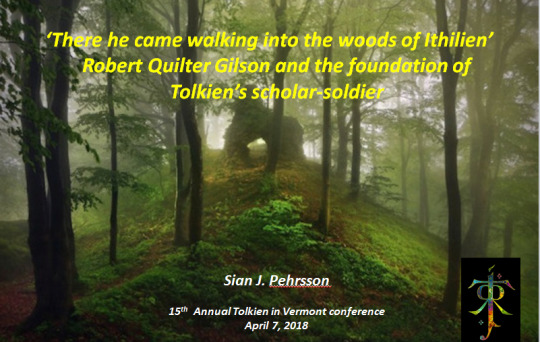
Faramir, Tolkien’s sensitive, reluctant warrior who declines the Ring, arrived quite late in the story of The Two Towers, appearing suddenly, and to Tolkien’s surprise, at a pivotal moment in the creation of the chapters ‘Of Herbs and Stewed Rabbit’ and ‘Window on the West’.


Ithilien’s Captain of record at that point, one Falborn, son of Anborn, was just finalizing his interrogation of Frodo and had been amusingly dressed down by Sam, when much lore and history of Gondor and Numenor began to be discussed. And, although a substantial part inevitably was cut to go into the Appendices, there was much that JRR wished to keep. To do that he needed a new character
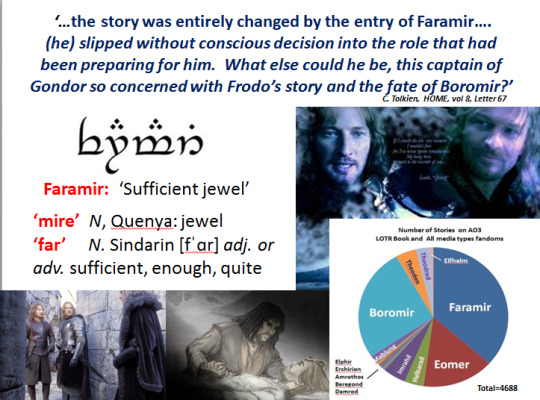
The name Faramir is most commonly translated as ‘sufficient jewel’ from ‘mire’ the Quenya for jewel and ‘far’ the Sindarin for sufficient or enough. In the Peter Jackson version of the character this was a deliberate slight, that he was essentially lesser than Boromir—the steadfast jewel. Perhaps, there can be a different take. If name is destiny, Faramir, named for a Prince of Gondor who defied his father’s orders, is actually, quite simply, enough. A modest, yet noble man, with just the wisdom to resist the Ring and a play a pivotal part in Sam and Frodo’s story.
Despite this, and his enduring place as the most popular minor male character, Faramir has not often been a subject of critical analysis.
The character was conceived of and came to fruition in less than a week in early May 1944 and the relevant chapter, ‘Window on the West’, according to Christopher Tolkien, was written at great speed. May 4th there was no thought of him but by 11th he had appeared. How was an author famously obsessive about revising, one who took a decade and half between first sentence and finalized manuscript (and in so doing converted his protagonist from a hobbit called Trotter to a scion of Numenor) able to fully realize such an enduring resonant character so swiftly?
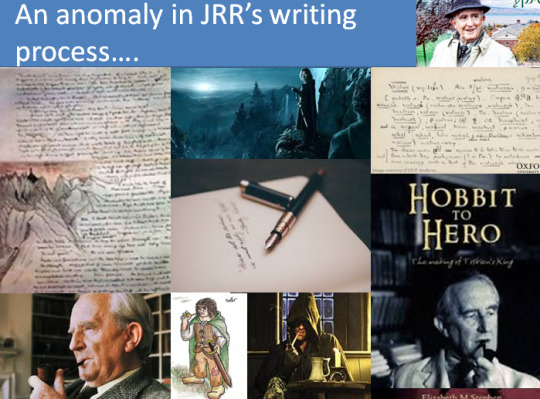
I suggest to you that it was because he had a model to draw from…. his childhood friend Robert Quilter Gilson

Robert Gilson, an artist and designer, was a member of the famous ‘Tea Club and Barrovian Society’. Hewas born in 1893 in Harrow on Hill, where his father, Cary Gilson, taught Classics. In 1900 the family moved to Marston Green when Cary became Headmaster of King Edward’s school. There, the TCBS tight circle formed, and like the others of the group, he went on to study Classics at Trinity College. His letters are a wealth of knowledge. He wrote daily, to family and friends, from university and from the Front where he served as a Lieutenant in the Suffolk regiment. He shared many qualities with Tolkien: a love of lore, and antiquity and history, but also strikingly many more with Ithilien’s Ranger.
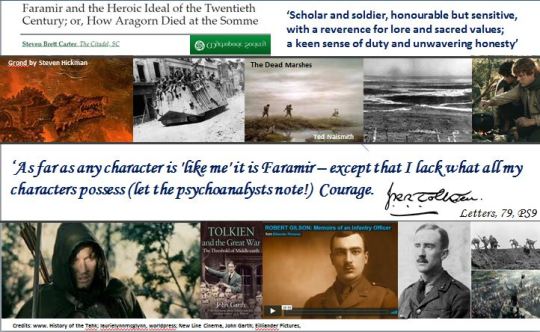
The influence of Tolkien’s war on his writing is fertile ground for study, be it the allegory of evil mechanization in Grond; or more direct examples in his imagery of the Dead Marshes, or Sam—the doughty british batman. Tolkien was part of a generation turned their grief to work, from Everest expeditions to his own scholarship-- it was a fertile time after that great conflagration.
With respect to Faramir much has been made about him as the embodiment of a modern warrior archetype, and Tolkien, when asked by a pesky journalist which character, presumably Gandalf, he was most like, replied “Faramir,” noting though, that he lacked the character’s essential courage.
I am going to suggest that Tolkien drew on a man very like him in many ways but one who also was demonstrably courageous: Gilson.
Creating characters readers connect with is one of most important challenges for a fiction writer, for a good use of characterization always leads the audience to relate better to the events taking place in the story. Physical and psychological traits, sociological and biographical details all lend themselves to creating character. Much of what we know about Faramir in the book comes from indirect characterization.. through the lens of Sam and Frodo, how he relates to them, and they to him, and his own actions. This approach is considered more effective because it slowly discloses the inner turmoil of the character, over the course of the narrative and lets the audience understand.
For the process of this I like Alexandra Sokoloff’s quote:
‘I think all writers are always collecting characters as we go along...[stored in] the back of our minds like the shelves full of buttons and ribbons and fabrics and threads and beads in a costumer’s shop.’
This surely lends richness…but also requires one has the 'bobs and buttons’ stored.
Below I shall compare the two men, real and fictional, through the lens of the character components outlined above.
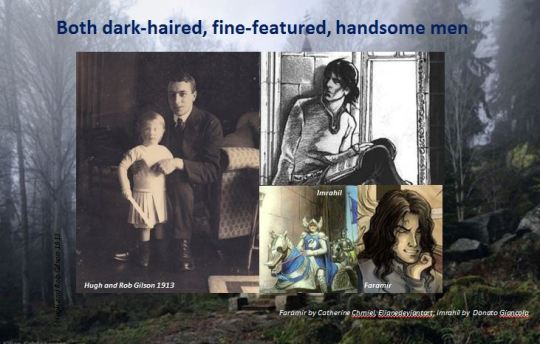
First are superficial similarities…
Faramir is typically depicted as more finely featured then his brother..an influence artists pick up, presumably from Finduilas of Dol Amroth and her descent from the elleth Mithrellas and Imrazor, the first Prince. In fact, Legolas remarks on Imrahil’s elven features in RoTK. Gilson had something of the Numenorean look given to Faramir: fine features, dark haired, and, as John Garth notes, calmly apprising eyes; a feature remarked of Faramir by number of characters in book.

Next we consider psychological traits. The above slide and below, via direct quotes from letters and the books, and John Garth’s extensive overview of Gilson’s own letters, illustrates a number of key commonalities.

Both were good leaders, loyal yet also thoughtful and poetic, but for Gilson this new role did not come naturally: he agonized over it. In a moving letter from Albert Bradman, his batman, to Cary Gilson, Bradman noted that Robert was ‘loved by all the men in the Platoon, and I may say Company, as he was a very good officer and a good leader.’
Of course, Pippin’s thoughts when first viewing Faramir, bowed and weary, at the entrance to the citadel run this very way.
There are sociological similarities between them as well. Both were conservative, as was typical of men of their social rank; pacifists and compassionate by nature, at ease across society and with people of every class.
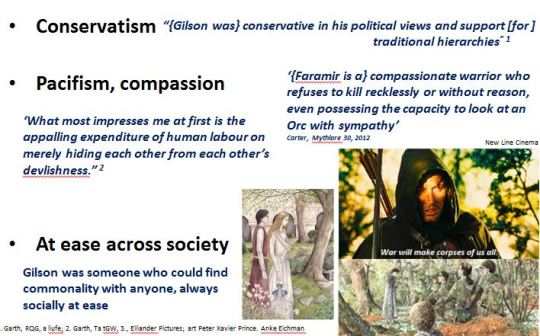
Both had a love of the archaic. For Faramir it is exemplified by his words to Sam and Frodo, and in his delight in tutelage by Mithrandir. Gilson, similarly loved an earlier time, for him it was Renaissance painting and sculpture and 18th century Neoclassical styles that looked back to earlier era. Both men enjoyed atypical, one could say unsoldierly pursuits. For Gilson it was art, design and even embroidery. For Faramir this was music and lore. Tolkien speaks of this deliberately, that these pursuits made men superficially judge him less courageous.
Both have a reverence for wild spaces and living things. Faramir was quite evidently at home in Ithilien and dreamt of making it the garden of Gondor once again. Gilson, restricted in what he could say in his letters from the Front, spoke frequently of his enjoyment of being on the move, in the beauty of the French countryside.

Both were modern soldiers in the sense used by Stephen Carter-- highly skilled, yet classically trained and not caught by conventional views of martial glory. Both were marksmen. Gilson’s eye for artistic detail transferred to riflery, where he won the Shooting 8 of the Officer Training Corps.

It is in their biographical details that the similarities become almost uncanny. Like the classical element of fairy stories, both lose a parent, their mothers, at a young age. Both men lived under the shadow of important, larger-than-life fathers who were the ‘rulers’ of their worlds. Faramir's being the ruling Steward and scion of Numenor; Gilson’s the headmaster of King Edward’s school,’ the self-contained world in which Tolkien and Gilson lived. Cary Gilson was an intimidating, formidable man, who moved in important circles but unlike Denethor, loved his son greatly, however much, in keeping with his era, he did not show it publically.
Gilson, like Faramir, followed his duty, if not his heart. The first of the TCBS to enlist, he left Cambridge where he had undertaken studies chosen for him by his father. Like Faramir, he struggled to live up to parental expectation at times, finding it hard to achieve grades expected in a subject he did not love. Ultimately he was confident enough to defy his father’s will and societal convention: just before the war, he announced he would give up Classics to study Architecture…something considered a ‘trade’ in those days, not a vocation.
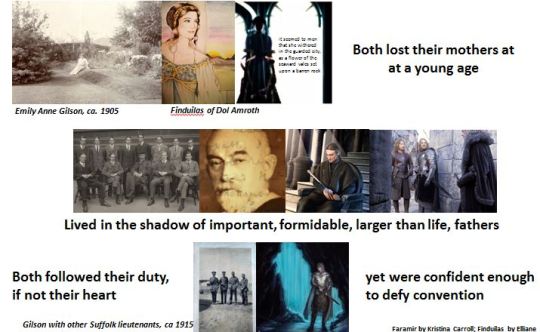
Both loved above their station and were initially rebuffed. Faramir’s true love is of course Eowyn of Rohan, niece of, and sister to, a King, Gilson’s was Estelle King, the daughter of the American Consul. They became friends on holidays in the Scottish Highlands but she was at first utterly shocked and flummoxed by his declaration of love. Gilson went off to France thinking his suit was lost but it was not so. On shore leave they became engaged. Letters between Gilson and the adventurous King, who was serving in Holland as a nurse, detail and deep affinity.
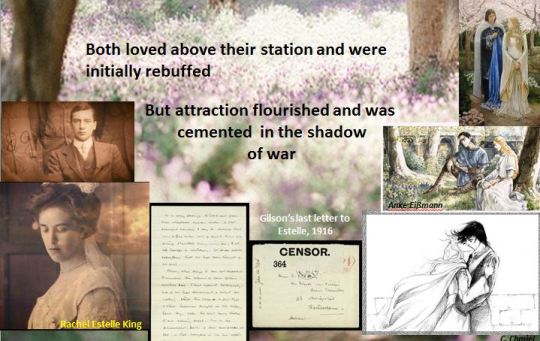
Most heartbreaking of all is the echo of Gilson in Faramir’s charge on Osgiliath: another personally courageous scholar-soldier, calmly leading his men against overwhelming odds into a rain of endless slaughter. Gilson’s battalion went over the top the first morning of the first day of the battle of the Somme, one that would in live infamy. Gilson, the last officer surviving in the midst of battle, he unflinchingly and briefly took over leadership of the entire company. The Suffolk Regiment’s loss that day was the largest of any single battalion in their division. 70% of the officers and 50% of men, far greater than Gondor’s retreat.
Unlike Faramir, Gilson did not survive. He was killed by a shell burst that morn.
Tolkien said of his friend’s death that ‘something has gone crack’, and it was so seminal a loss that for the first time in a decade he said he felt ‘a mere individual’.
Geoffrey Bache Smith of the TCBS memorialized Rob in his poem “Let us tell quiet stories of kind eyes”
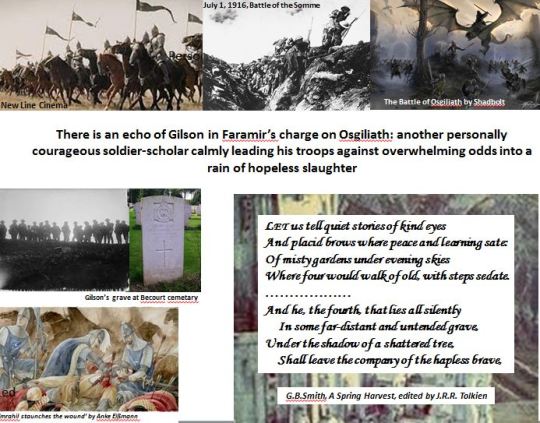
To conclude, I suggest Tolkien was able to paint such a resonant portrait in so short a time, to develop a fine characterization of a sensitive poet-soldier, adored by his men, driven by duty to do what goes against his nature, by drawing upon one he knew in life, subconsiously or otherwise. And in this we have another influence of the Great War and his childhood friends on Tolkien’s work.
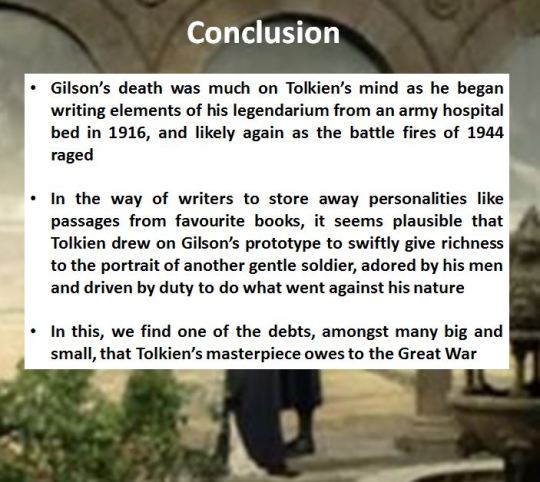
Acknowledgements and Sources below:
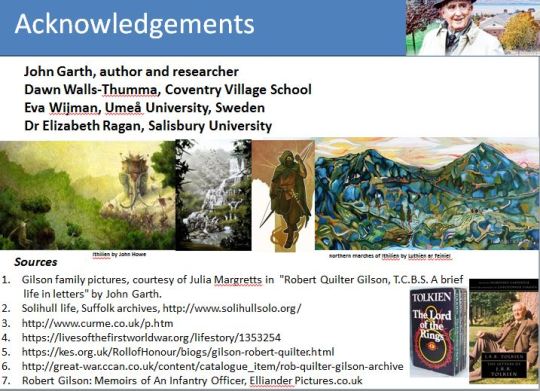
45 notes
·
View notes
Text
The Three Fandoms Asks
I keep seeing this around tumblr, and it looks fun.
3 fandoms (I chose three important ones from my childhood)
1. Harry Potter - The Original Fandom. I mean, not the original original obviously, but probably the original for my generation. It was a huge part of my childhood and the story itself formed a lot of my opinions about how to tell good stories. I also have fond memories associated with this series -- Harry Potter was the first reason I ever had for Googling anything. “Harry Potter Book 5 news” and “Harry Potter Book 6 rumors” became frequent searches of mine. (The rumors took me to a lot of chat rooms where I read up on the wildest theories. It was a blast.) And then there were the midnight visits to Barnes and Noble and, in one memorable case, Walmart the nights of the book releases. Harry Potter was my childhood.
2. Lord of the Rings and The Hobbit - Like Harry Potter, these books (and movies) taught me a lot about storytelling. Tolkien’s works have become more complex to me as I’ve gotten older, and I’ve found there are plots and characters I like more now than I did as a kid (as opposed to Harry Potter, which my opinions about have mostly stayed the same). I also love Tolkien’s writing and world building. I’m one of the few people I know who enjoys reading all the poetry, and I read “The Council of Elrond” chapter three or four times before I got tired of it on Fellowship rereads. Lord of the Rings is a fantastic example of a really good book being adapted into really good movies. Both the book and the movies are each their own thing while also complementing each other. Just -- Lord of the Rings, man. I love it.
3. Charmed - Not as good, quality-wise, as the other two I’ll admit, but damn do I love this show. Before Charmed, I kind of watched whatever my family or friends watched -- my brother was a TV hog, and while I liked his cartoons ok, I didn’t like them nearly as much as I did Charmed when I discovered it. I got my dad watching it and it kind of became our thing. The Charmed Ones were kind of role models in a way. I can remember thinking, This is what being in my 20s will be like. Not the magic, but dating and clothes and deciding whether to go corporate or pursue your dream job or go back to school. People accuse the Charmed Ones of being boy crazy, but what I remember most about them is their work ethic. I thought, Prue prioritizes work, and I want to be like Prue. I love this show.
First character I loved:
1. Professor McGonagall is, has been and will always be my favorite character in anything ever. I also remember being small and redheaded and really liking Ginny Weasley before many other people did.
2. Arwen was the first, but that was only because she appears in the movies before Eowyn.
3. Prue. Although I like all four sisters.
The character I never expected to love so much:
1. Sirius Black is obviously introduced as this terrifying villain, so when I started reading Prisoner of Azkaban, I didn’t expect him to become one of my favorites. To be honest, my fan girl love of him has waned since I was a teenager, but I still appreciate him.
2. Sam Gamgee. Another of my favorite characters in all of literature, though I had to mature a bit before I felt that way. But Sam is so small and overlooked, yet he’s so loyal, brave, determined, sassy and just all around good. He’s a gardener, which is a profession Tolkien holds in high esteem. Also in the books he doesn’t have that awkward break-up with Frodo that he does in the movie, plus he’s less whiny. (To be clear, I’m criticizing the movie’s writing, not Sean Astin’s performance. He did great especially considering the material he had to work with, and he feels the same way about the character I do. Also, his book about making the movies, There and Back Again, is the first nonfiction book I ever read for fun.)
3. Cole Turner. I came into the show in Season 4 right as his baby was turning Phoebe evil, so I was like, “Ah, ruler of Hell, not good.” My dad and I had to start the show over and watch Season 3 to realize he’s one of Charmed’s most complex characters.
The character I relate to the most:
1. Probably Ginny, especially as a kid. We’re physically similar, but there’s also the temper and the fact that people always end up being surprised she’s as tough as she is. She and I also had to both grow out of self-esteem issues, though hers were more severe since they came from Chamber of Secrets-related trauma.
2. Pippin. He’s not sure if he’s actually qualified to be on that adventure, but hell if he’s being left behind. Also he’s small, like Ginny and me.
3. Prue. Sort of opposite of the Ginny stuff, she’s got the older sister syndrome of being responsible, in charge, bossy and often feeling like the only person who can get a job done right.(I don’t like having help with dishes or laundry, nor do I like assigning other reporters crime stories at work, as a couple of examples.) I am pretty protective of my younger brother and my mom always quoted It’s a Wonderful Life with the “you were born older” line when talking about me. Also like Prue, I tend to over-focus on work and not enough on my social life.
The character I’d slap:
1. Percy. Don’t get me wrong, he’s a fabulously complex and underrated character, but I would still slap him silly.
2. Denethor. I used language I’d never used before in the theater when he sent Faramir off to fight in Return of the King and I started laughing a few minutes later when Gandalf knocked him out with his staff.
3. Ugh. Leo. (Also Sam.)
Three favorite characters in order of preference:
1. McGonagall, Harry, Ginny. (That last one was insanely difficult as I also considered Snape, Lupin, Regulus and Luna.)
2. Sam, Eowyn then Aragorn (movies) and Bilbo (books).
3. Prue, Piper, Phoebe (Sorry Paige.)
Character I liked at first but don’t anymore:
1. I mean, I’m not going to say I don’t like Hermione, because I definitely do, but the movies wore me out by over-glamming her to the detriment of Ron Ginny other characters.
2. I like all the characters except Denethor, who I never liked. Ditto Grima Wormtongue.
3. Believe it or not, I liked Leo when I was a kid. (*shakes head at how naive 13-year-old Iz was*)
Character I did not like at first but do now:
1. Narcissa and Snape. This is not to say their views or the pro-Death Eater actions are ok, but they were both smart, they surprised me (always a plus) and they helped defeat Voldemort.
2. Didn’t like Boromir or Faramir at first, but now I love them.
3. Paige.
Three OTPs:
1. Harry/Ginny, Ron/Hermione, Lily/James
2. Arwen/Aragorn (in a doomed, tragic way. Seriously, read the Appendices.) Eowyn/Faramir and Linsdey Ellis got me liking Eowyn/Merry
3. Piper/Mark Chau (I will never be over it!), Paige/Henry, Phoebe/pretty much anyone, including but not limited to: Cole, baby Misha Collins (Eric Bragg) and Aviva from Season 1 (#Phoebeisbisexual).*
* I really just think that everyone Phoebe interacted with before Season 3 should have come back as a love interest after she and Cole divorced. Aviva would have been old enough for that by then, and we could have gotten great sub plots of Eric Bragg’s little conspiracy theory brain trying to figure out which secret organization the sisters work for before Phoebe tells him they’re witches. (Then he and Henry could meet for beers after work and talk about how goddamn weird their lives are.) Any of that would have been better than the post-Cole love interests Phoebe got. (One of them was named Leslie?? And he took her job?? Fuck Brad Kern, honestly.)
I’m going to break the rules by not tagging people, but whoever wants to play should go for it.
#harry potter#lord of the rings#charmed#professor minerva fucking mcgonagall#sam gamgee#prue halliwell#Ginny Weasley#anti-Leo Wyatt#also anti-Denethor in case he has any fans
2 notes
·
View notes
Note
i know people are saying the ending will be bittersweet and what that could mean, but I think it will end with jon, dany, and their heir ruling over a new form of the 7 kingdoms (breaking the wheel). As for the bitter part, I think perhaps all of the dragons die, but right at the end we see more eggs, signaling that they will live on in the future
I agree with most of this! I think that most of us in the fandom are programmed to expect the worst ever since book/season 3 because of the Red Wedding. That’s why there are so many doom and gloom theories about the ending.
That being said, I do understand why so many people readily assume Jon, Dany, or both will die. I don’t think both will, but I would not be a bit surprised if one of them does. But the more I think about it, the more I’m starting to think they might both make it out alive.
After reflecting more about LOTR (which GRRM frequently compares his work to) and GRRM’s assertion that he thinks readers will find his ending to be just as happy as it is bitter
“I’m not going to tell you how I’m going to end my book, but I suspect the overall flavor is going to be as much bittersweet as it is happy.”
(Source)
I feel that we can reasonably expect Jon and Dany’s survival. I think that because if we connect it back to LOTR, the principle characters in that series do live, even if it’s not all happy. GRRM had this to say about it:
“It’s no secret that Tolkien has been a huge influence on me, and I love the way he ended ’Lord of the Rings.’ It ends with victory, but it’s a bittersweet victory. Frodo is never whole again, and he goes away to the Undying Lands, and the other people live their lives. And the scouring of the Shire —brilliant piece of work, which I didn’t understand when I was 13 years old: ’Why is this here? The story’s over?’ But every time I read it I understand the brilliance of that segment more and more. All I can say is that’s the kind of tone I will be aiming for. Whether I achieve it or not, that will be up to people like you and my readers to judge.”
(Source)
And so even though the overall tone of GOT/ASOIAF has been a bit pessimistic, and even though the the book and the show (until season 6, anyway) have been basically a practice in overthrowing expected tropes and “happy endings” for character arcs, I think we can see all of that having been an exercise in preparing the characters for their final trials. And I think that in the end, they can overcome that and be allowed to live, even if not altogether “happily.”
After all, ASOIAF is his life’s work. Who wants to spend all of this time and energy writing a series that ends tragically, even after years of tragedy? What would be the point? The theme? The message? The takeaway? If all of our heroes die, what is the reader to take from ASOIAF?
Because if we look at other “everybody dies” narratives, there’s a clear reason why. Hamlet, for example, has a pretty unsatisfying ending in that all of its main characters die. Horribly. But we can trace the reason why for all of these characters. Hamlet himself suffered from indecision and inaction. Ophelia ignored her brother’s advice and got too swept up in romance with the unavailable Hamlet. Gertrude fell for her husband’s brother and murderer, betraying his memory. Laertes was a hypocrite–engaging in reportedly raucous and disreputable behavior in France yet trying to control his sister’s life and scold her for being potentially reckless by pursuing Hamlet.
So it was sad when all of these characters died but we could take lessons from how they acted.
Same with other Shakespearean tragedies. In Macbeth, the title character and Lady Macbeth die because of their “vaulting ambition” to overthrow the king, stepping out of the sacred social hierarchy and trying to seize rather than inherit royalty. And Macbeth himself also paid the price for trusting in the fickle nature of prophecy by misinterpreting the words of the Weird Sisters and believing that he would be safe from traitors.
Now let’s look at ASOIAF. Many of the characters who have died, died for arbitrary reasons. We can’t always easily trace a cause like we could with other tragedies. It’s easy to write Ned off as “too honorable” as I see many people do. But ultimately he was willing to sully his own honor in order to protect Sansa. He still died even when he sacrificed his ideals, abandoned the “right thing” of opposing Joffrey. There isn’t an easy solution to his death.
Margaery also did everything right. She was a master of manipulating the men around her to protect herself and her family, all the while elevating the Tyrell family name. But still she was murdered.
Deaths like Robb’s, Catelyn’s, and Oberyn’s can easily be traced to a character flaw. But that’s not the case for all of the big ASOIAF deaths. And it wouldn’t be the case if our remaining heroes were to die in the war.
Even Jon, who is constantly at the heart of the love vs duty conflict, should at this point be allowed to survive the series. He chose duty over love, chose the Watch over Ygritte. He was loyal to his men and his responsibility even when they weren’t loyal to him. He still died.
So if characters like Jon or Dany, who have made mistakes in their arcs already and already paid the price were to die in the end, what is the point? What is Martin really trying to say about the human experience or human nature or war?
I think the characters need to live, even if things go wrong, that way at least there has been a point to all the suffering. This is especially true when we look at LOTR as a comparison piece.
Sam’s famous speech comes to mind:
“It’s like in the great stories, Mr. Frodo. The ones that really mattered. Full of darkness and danger they were. And sometimes you didn’t want to know the end… because how could the end be happy? How could the world go back to the way it was when so much bad had happened? But in the end, it’s only a passing thing… this shadow. Even darkness must pass.”
The same has got to be true in Planetos. I have to believe that. And I think Martin does, too. So that his story can show that even in the worst of times–like the times our world is facing now, for example–humanity can find it in themselves to persevere. Martin even said recently that the White Walkers are like a metaphor for climate change. This makes sense considering the wonky seasons in Planetos. So if that’s true, then we know that modern, topical issues and themes are part of this story. And what would be the point of suggesting that humanity will succumb and fail at combating climate change? Why suggest that we would fail at or die in the process of overthrowing despotic rulers? Why write a story that doesn’t teach or encourage its readers?
Even with the negative tone throughout, I don’t believe GOT or ASOIAF are nihilistic. I think we can expect a more positive ending. This quote says it better than I could:
“Needless to say, it doesn’t really make much sense with what we’ve seen so far that the ending of A Song of Ice and Fire/Game of Thrones would echo Lord of the Rings’ relatively happy conclusion. Though it could be the case that Martin has been saving up years and years of pain and misery for a grand turnaround that does indeed lead to a somewhat uplifting ending.
All the years of pain and suffering may indeed be building to some enormous payoff. Jon Snow will likely survive his own death and live to become Azor Ahai reborn, as the prophecy foretells. Dany will find her dragon-riding support staff. Arya will become the most badass assassin in the realm. Even if (when) more beloved characters die, at least a few should survive until the end (smart money says Tyrion will go the distance), and perhaps the realm won’t be completely frozen and shattered when the last page of the series is turned.”
(Source)
So, yeah–I think we’ll have plenty of sweet to combat what was already a very bitter story so far. However, I don’t think we will see more dragon eggs.
Magic going out of the world was a theme in LOTR and I think it’s a theme in ASOIAF too. The Children of the Forest have now died out. Until recently, everyone in the realm believed that the White Walkers/Others were already gone. They believed dragons were gone. And the supposed abilities of people like Melisandre and Thoros are met with suspicion and skepticism/doubt.
So I think that magic has only really returned as a way to balance the fight and help humanity face the Long Night. That’s the only reason why. And once they’ve had the Battle for the Dawn, the dragons will likely be the price paid for peace.
117 notes
·
View notes
Text
One Year: Carnation Books Staff Q&A- Lee, CEO
What do you do for Carnation?
I like to describe myself as the Captain of this Starship, but I guess you can technically also call me the CEO (that's my legal title). I was fortunate enough to be in the right time and place and have the resources to bring Carnation Books to life, but it's been a tremendous group effort as well, bringing a company up from zero with no outside investment. We're 100% fandom-powered, and everyone who's involved with us is also involved in fandom in some respect. As the Captain, I guess I steer the ship, but there are a lot of great people who actually make it go.
What’s your main fandom?
BBC Sherlock was the unquestionable impetus for Carnation's creation. It was the catalyst for me getting back into fandom after a long axe battle with depression over the better part of a decade. I first got into Sherlock when I was stranded and terribly bored on the worst vacation ever, and I was in the mood to read something completely new. "I do love murder mysteries," I said to myself, "and I've never read Sherlock Holmes. And that Benedict Cumberbatch fellow is very handsome, isn't he? He was so good as Khan in Star Trek, and isn't he Sherlock on television? And Martin Freeman is a cutie, too, and he's Watson... Well, I wouldn't mind imagining Holmes solving some mysteries together with his BFF Watson!"
Ohoho, little did I know how much my life would change, from the first moment that Sherlock "gripped" John's hand at the beginning of in "A Study in Scarlet." This was in early 2015, I think? It was well after Season 3 had ended, and just before the special episode "The Abominable Bride" was announced. Since then, the BBC Sherlock fandom (and specifically Johnlock) has changed my life in ways I never could have imagined. And when people ask me this question about my main fandom, my instinct is to say Sherlock.
But, to answer the actual question, uh, my fandoms and ships are:
-BBC Sherlock (John/Sherlock and Greg/Mycroft)
-Star Wars (Kylo Ren/General Hux and Matt the Radar Technician/Clan Techie (the "crack ship" that blindsided me with feelings so strong I cried literal tears))
-Harry Potter (Draco/Harry and Remus/Sirius)
-Star Trek (Reboot Kirk/Spock and some miscellaneous pairings; I share this fandom with my husband!)
-Cabin Pressure (Douglas/Martin and Arthur/Martin, I love them both)
-Hannibal (Hannibal/Will, aka The Only Ship)-Marvel (Steve/Bucky)
-Tolkien (Sam/Frodo and Thorin/Bilbo)
-Kingsman (Harry/Eggsy)
Also, my main hobby outside of western media fandom is video games, which is kind of a fandom in itself, in addition to fandoms for individual games that spin off great fanfiction and fanart. I'm also in the Game Grumps fandom, which, as a comedy Let's Play channel, is kinda peripheral to video games.
What’s your OTP?
I have three answers to this question:
1) My first OTP (before the phrase "OTP" came into frequent usage) was Mulder/Scully from "The X-Files." I had a yellow accordion folder full of G-rated fics that I carried everywhere with me for the entire summer of 1997, including on three vacations. (My parents were pretty tolerant of their quirky kid.) I read a handful of slash fics (mostly Mulder/Skinner) but I definitely didn't ship Mulder with anyone but Scully. I mean, they're totally canon.
2) My OTP for my whole adolesence was Sirius/Remus from Harry Potter. From 7th grade on, I was well obsessed with Harry Potter, and after the third book came out, I read and re-read it, and carried it everywhere with me. It was my first slash pairing where I really saw the romance, and really believed that the characters were meant to be together (and, in the case of Sirius/Remus, had already been together in the past). I read hundreds of Remus/Sirius fics during high school--definitely a formative time in my personal and fandom development. (And really, aren't they the same thing?)
3) The OTP that changed my life, John/Sherlock. What can I say about these two that haven't been said by people much cleverer and more passionate than me? All I can add here is that I'll love the two of them forever, no matter what.
What are your favorite tropes?
FAKE RELATIONSHIP! I've been on that fake relationship drug since Mulder and Scully had to pretend to be married to solve cases. It's just as good when John and Sherlock have to do it. I love all the attendant tropes, too, like bed-sharing, awkward PDA, mutual pining, and that kiss that starts out awkward but blossoms into the real thing and leaves both characters breathless. You know, the usual.
I don't know if this counts as a trope, but I only read fics with happy endings. You can have as much angst as you please, but as long as no good guys die and the pairing ends up happily living together and in love, then it's good enough for me. I love some good old-fashioned hurt/comfort, but "Happy endings only" is kind of my personal motto.
Most fic read in one sitting?
My longest total fic binge would probably be that one holiday where I did nothing over a 4 day weekend aside from reading the complete masterpiece "Children, Wake Up" by Holly Hark, @hollyhark aka hollycomb on AO3 (https://archiveofourown.org/series/386986). It was absolutely glorious.
What are you reading right now?
Right now my imagination is totally taken with the Johnlock surfer AU "Gimme Shelter," by @sincewhendoyoucallme-john (https://archiveofourown.org/works/11578941/chapters/26020017). It's a total breath of fresh summer air. I don't usually read WIPs, but this one's like a vacation to the beach. A sandy, salty Pacific ocean beach in the 1970s. Listen, just read it.
I'm also slowly making my way through the back catalogue of @berlynn-wohl (http://archiveofourown.org/users/berlynn_wohl/), but I've been at it almost a year, and my progress is frankly a bit embarassing.
What are you working on for Carnation right now?
*conspiratorial whisper* a lot of secrets! Keep watching our blog for a ton of awesome book announcements coming so very soon!
What would you like to tell people about Carnation Books?
The number one thing I want people to know is that we're doing everything we're doing for the love of fandom. The company is 100% devoted to fandom and fanfiction writers. We're doing this out of love for fandom, with the sole goal of uplifting and celebrating fanfiction writers.
People should also know that we are a startup, we've only been around for a year, we're entirely bootstrapped with no outside funding, and we're pretty much a ragtag gang of plucky outsider underdogs when it comes to publishing (although we've gotten professional assistance where it counts, like our great publishing specialist lawyer and our accountant). We're just fans who are trying our best to support other fans, because we believe in the power of the fandom community. If you believe, too, then we want you to join us.
I also want anyone reading this to know that we fully believe that the world of books is big enough for everyone. We support other publishing companies, and we support writers who choose to publish elsewhere. We just wish everyone the best :)
I am incredibly lucky to have the circumstances that enable me to captain this starship, and I also understand the tremendous responsibility inherent in caring for other people's creative endeavours. I wish I could personally thank every single person who's ever said an encouraging word about us, or to us. I'll have to just say it here--thank you so much for your support. We look forward to proving you right over the next 12 months.
Here's to Carnation Books: Year Two!
We’re all really lucky, and really happy to be working with Lee on this amazing adventure. All of Carnation Books’ staff wishes Lee and this wonderful dream of theirs a very happy birthday. We can’t wait to see what the next year brings. <3
22 notes
·
View notes